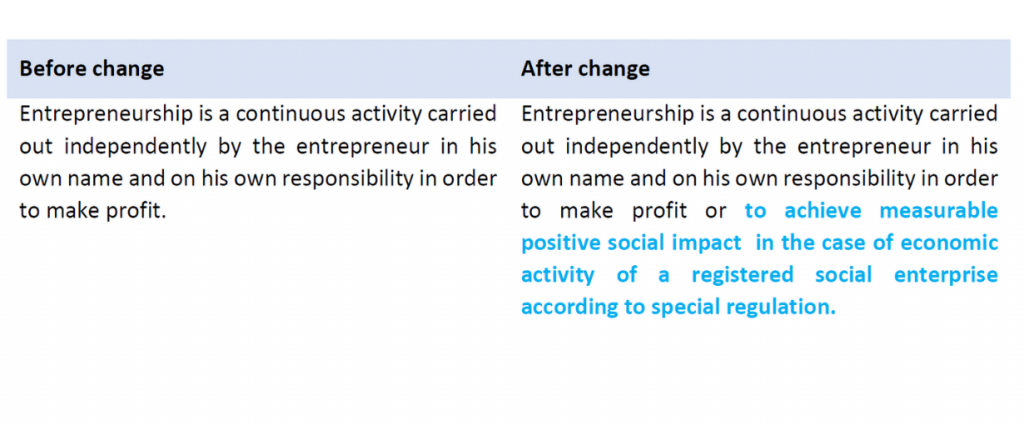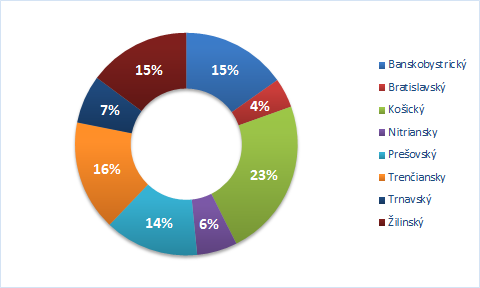

Having legislation that would define social entrepreneurship is still a struggle in some of the European countries (including Czech Republic and Hungary).
Slovakia, as one of the counties we focus on in this project, has accepted the Act nr. 112/2018 Z.z. on social economy and on social entrepreneurship and on changes and amendments to some acts in 2018, which is a step forward not only legally but hopefully it can change the whole perception of social entrepreneurship in Slovakia.
The main goal of this act is to introduce the social dimension of entrepreneurship into the Slovak legislation. The social aspect of entrepreneurship has been established abroad already a long time ago and social businesses became a stable part of other EU markets enjoying popularity among customers striving for positive impact on society.
People usually understand socially beneficial entrepreneurship as a concept addressing mainly the problem of social inclusion through sheltered workshops or work with disadvantaged people. Thanks to this act the term socially beneficial entrepreneurship has been broadened to every activity contributing to public interest or to community interest (Act 112/2018 Z.z.) This definition covers not only currently perceived social problems, such as health care or protection of human rights, but also academic research and development, environmental protection or education.
Act on social entrepreneurship delivered multiple changes. The main change occurred in the definition of entrepreneurship itself in the Commercial code. The definition was enriched by public interest dimension of entrepreneurship, thus enabling it to obtain the same relevance within company goals as making profit.

Besides the definition of entrepreneurship, the act offers definitions of a wide variety of terms such as social economy, social enterprise or list of socially beneficial services.
„Social economy is the sum of productive, distributional or consumer activities carried out through economic or non-economic activity independent from public authority bodies whose main goal is to achieve positive social impact.(Act 112/2018 Z.z.)“
Further changes occur in support measures in accounting and profit generation allowing registered social enterprises to use financial and tax relief. The support measures are divided into two main categories: investment and compensation aid. Registered social enterprises are entitled to special status which qualifies them to participate in special grant schemes or to use service vouchers (support measures to increase the demand).
So far we perceived socially beneficial enterprises mainly as NGOs or sheltered workshops. Considering the Act a social enterprise can assume any kind of legal form established in the national law as well as EU law as far as its main goal is achieving positive change in society either directly by helping disadvantaged groups, offering socially beneficial services or dedicating more than 50% of profit to achieve the positive social impact.
In Slovakia, the prevalent legal form of social enterprises is limited liability company. Under this form acts more than 90% of registered social enterprises. Other forms such as cooperative (družstvo), civic association (OZ), non-profit organisation or natural person (fyzická osoba) occur in small percentages.
The regulation defines three types of registered social enterprise:
Every type provides specific services. The goal of integration enterprise is to have a minimum 30% of own employees coming from disadvantaged groups. Social housing enterprise accomplishes positive impact by renting housing facilities to disadvantaged groups. For the third type – general registered social enterprise – there is no particular activity outlined in the regulation which allows a wider business audience to become a registered social enterprise.

The vast majority (89%) of social enterprises are registered as integration enterprises. Only 1% is registered as a general registered social enterprise meanwhile the remaining part (10%) is registered under a combination of above-mentioned social enterprise types.
When comparing the financial commitment to the social impact, almost 85% of registered businesses decided to dedicate 100% of profit to the cause which leaves 15% of business contributing more than 50% to the cause.
There were a total of 256 registered social enterprises in 2020 in Slovakia. These were distributed unevenly among regions with the highest peak occurring in Košice region (eastern Slovakia). This might be due to the higher innovation potential (innovation hubs) as well as unfavourable economic conditions and higher ethnological diversity. Further, we observe a low number of social enterprises in richer regions like Bratislava and Trnava regions where the overall business activity flourishes.

Graf: Distribution of registered social enterprises among regions in Slovakia, Ministry of labour, social affairs and family of the Slovak Republic, 2020.
Besides these types of businesses, the act also defines enterprise with social impact. Positive impact within this type can be achieved for example by the way of producing or distributing its product and services, involving stakeholders (interest groups as defined by the act) or investing a part of its profit to achieve the positive impact. The main difference between registered and non registered social enterprises consists in the ability to comply with established rules and criteria in the long-term perspective. More information can be found directly at the page of Ministry of work, social affairs and family.
Do you think of yourself as a social innovator or do you already lead a social enterprise? Let us know about your idea via form.
Social enterprises, like many other businesses, can form associations. The main goal of these associations is to support social entrepreneurship and social economy as well as act as representative body for law negotiations. There are currently two umbrella organisations for social entrepreneurship:
Associations help the business to obtain the investment aid resulting from the act or promoting further benefits of social entrepreneurship. If you decide to work in this area, being a member of an association can definitely help you to develop your social enterprise. You can find many helpful information also at https://socialnaekonomika.sk/ , which will navigate you through every aspect of social entrepreneurship in Slovakia.